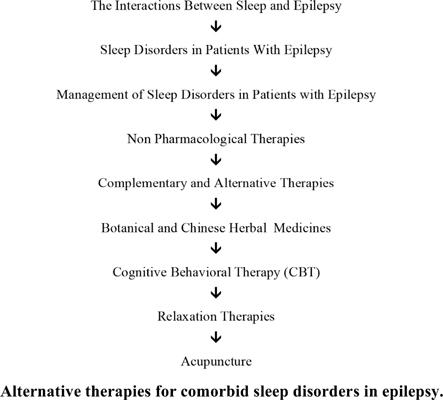Current Neuropharmacology ( IF 4.8 ) Pub Date : 2021-07-31 , DOI: 10.2174/1570159x19666201230142716 Weifeng Peng 1 , Jing Ding 1 , Xin Wang 1

|
Background: There is a complex and interactive relationship between sleep and epilepsy. Sleep disorders are common in patients with epilepsy, and methods for managing sleep disorders in patients with epilepsy are limited.
Objective: This review addresses the relationship among sleep, sleep disorders, and epilepsy, focusing on the management of sleep disorders in epilepsy, including some complementary and alternative therapies.
Methods: The terms related to “sleep” and “epilepsy” were searched in “Pubmed” and “Cochrane Library”.
Results: Sleep stages differently affect both seizures and interictal epileptiform discharges. Seizures disrupt sleep architecture greatly, especially when occurring during sleep in the night. Insomnia and obstructive sleep apnea (OSA) are the most frequent types of comorbid sleep disorders in patients with epilepsy. Pharmacological agents with both anti-convulsant and sedative effects are the priorities for comorbid sleep disorders in epilepsy. Continuous positive airway pressure (CPAP) therapy is the most effective non-pharmacological method to improve OSA and reduce seizures. Complementary and alternative therapies such as Chinese traditional medicine, cognitive behavioral therapy, meditation, yoga, neurofeedback, and acupuncture may have benefits in reducing seizures and improving sleep quality simultaneously by alleviating stress and seizure triggers; however, evidence- based therapies are still deficient.
Conclusion: Management of sleep disorders in patients with epilepsy is challenging. Large-scale randomized controlled clinical trials are in demand to guide the treatments in the future.
中文翻译:

癫痫共存睡眠障碍的管理和替代疗法
背景:睡眠与癫痫之间存在复杂且相互作用的关系。睡眠障碍在癫痫患者中很常见,并且治疗癫痫患者睡眠障碍的方法有限。
目的:本综述讨论了睡眠、睡眠障碍和癫痫之间的关系,重点关注癫痫睡眠障碍的治疗,包括一些补充和替代疗法。
方法:在“Pubmed”和“Cochrane Library”中检索与“睡眠”和“癫痫”相关的术语。
结果:睡眠阶段对癫痫发作和发作间期癫痫样放电的影响不同。癫痫发作会极大地破坏睡眠结构,尤其是在夜间睡眠期间发生。失眠和阻塞性睡眠呼吸暂停(OSA)是癫痫患者最常见的共病睡眠障碍类型。具有抗惊厥和镇静作用的药物是治疗癫痫合并睡眠障碍的首选药物。持续气道正压通气 (CPAP) 治疗是改善 OSA 和减少癫痫发作的最有效的非药物方法。中医、认知行为疗法、冥想、瑜伽、神经反馈和针灸等补充和替代疗法可能通过减轻压力和癫痫发作的诱因来减少癫痫发作并同时改善睡眠质量;然而,基于证据的治疗仍然不足。
结论:癫痫患者睡眠障碍的治疗具有挑战性。需要大规模随机对照临床试验来指导未来的治疗。











































 京公网安备 11010802027423号
京公网安备 11010802027423号